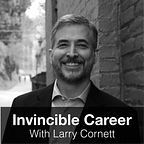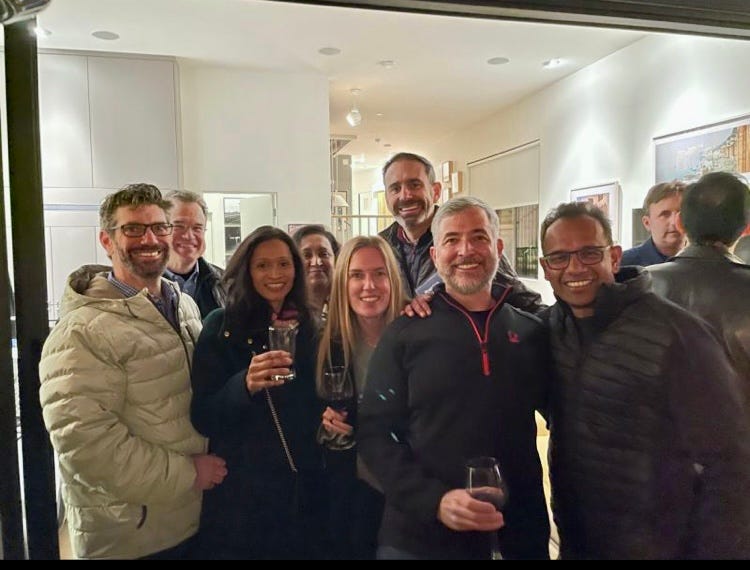Do you have a colleague or friend who might be interested in the advice I publish in this newsletter? Feel free to share it with them!
Did you know the average American hasn’t made a new friend in five years?
As we grow older, we make fewer friends than we did as children and young adults during school, college, etc. It’s probably not surprising that many of our friends come from our work experiences.
I used to work at eBay many years ago, and I recently attended an alumni event in the Bay Area of California. It’s a long drive to get there from where I live now, so I initially hesitated when I saw the invitation. Also, I’m an introvert and rarely enjoy social events like that. But it was a great opportunity to catch up with some old friends I haven’t seen in a very long time. So, off I went!
The wave of nostalgia and fondness I felt for these people surprised me. Even for those I had not particularly felt close to when I worked there. We’re older, wiser, and kinder now. The passage of time has sanded down the harsh edges of the memories of the intense workload, stressful projects, and confrontational arguments.
We had been through a shared experience, bringing us closer together. As one friend put it, after we hugged:
"We have a trauma bond."
Unfortunately, there is a price to pay for forging such deep relationships with coworkers. Leaving the company feels like losing most of your friends. And it's never the same again.
Also, every step that brings you closer to your coworkers is a step that takes you further away from your family and friends outside of work. That was simply the reality of employment for most of our lives. We spent way more time with our colleagues than with our loved ones. It was certainly true for me.
However, the last few years changed everything. People began working remotely and staying home. The pandemic lasted longer than we expected it would. When we could finally come out of our homes and back into the workplace, employers discovered that most of their employees did not want to return.
People enjoy the flexibility of working when and where they desire.
Many of us have found we can focus better without interruptions from coworkers.
They are saving money by working at home (I’ve saved about $150K over the past 12 years).
The time savings are significant when you no longer have to commute to an office (I spent 750 hours/year on the freeway).
Some people have moved to a better location for their financial and emotional well-being.
They have rebuilt stronger relationships with their loved ones.
They are exercising again, eating healthy meals, and sleeping more.
This year, Buffer published its 2022 State Of Remote Work. They surveyed 2,118 people from 16 different countries to get their input on remote work and its impact on their work and personal lives.
Here are a few more highlights:
97% would like to work remotely, at least some of the time, for the rest of their careers.
90% described their experience with remote work as either very positive or somewhat positive.
But, 45% think that career growth is more difficult for remote workers to achieve.
However, even I will admit that our enhanced lifestyle from remote work has come at the cost of work relationships. Now, some leaders are desperately promoting a return to office (RTO). They claim that collaboration and innovation can only thrive when people share physical space and time.
They're not completely right about this, but they're also not totally wrong. As much as I love remote work — and I have built friendships and working relationships with people I've never met in person — the bond isn't the same as it is with people who worked with me in the trenches. Like my friends at eBay.
We worked side by side every day.
We saw each other at our best and worst.
We shared meals and drinks.
We laughed and cried.
We supported each other.
However, the answer must be somewhere in the middle. As with many things, the truth is in between polarized opinions.
People must stop denying that dedicating most of our waking hours to our employers damages our personal relationships. How could it not? I have friends who regret missing out on their children’s lives. I have friends whose marriages fell apart because they were never home.
But we also can't deny that 100% remote work isn’t the best for working relationships. It doesn’t have to be a choice of always working remotely vs. always working in an office. For example, Automattic has a great remote work model, but they regularly schedule team gatherings in person (more on this in a future newsletter).
The office environment is not the best for everyone at all times.
Power dynamics are heightened, which makes people defer to authority too often.
As I know all too well, introverts can't do their best work when surrounded by noise and constant interruptions.
People with disabilities often struggle in the workplace, and some can’t take part at all if we forced them to travel to an office.
Creativity is stifled inside corporate walls.
Sometimes work is best done outside the office. And there are many types of work that do not need to take place sitting alone in a cubicle.
However, there are also types of work we should perform together in person. For example, collaborative riffing on a physical whiteboard can never be replaced by the poor substitute of virtual whiteboards.
The nuance of human expressions, tone of voice, and body language get lost in laggy digital proxies like Zoom meetings, where you only see someone's talking head. Plus, people don't behave naturally on camera. We’ve been doing this for years, yet video meetings still feel clumsy and awkward compared to in-person meetings.
Where am I going with all of this?
Well, if you’re trying to find a new job or work more effectively with colleagues in your current job, you need the best of both worlds. We’ll never put the remote work genie back in the office bottle. So, you need to make the best of virtual relationships and interactions. But I’m also going to encourage you to tap back into the power of face-to-face conversations and meetups.
Connecting with people, building relationships, and bonding will always be easier in person. So, find ways to start making that happen again.
Finding a remote job in this economy
In this newsletter, I'm going to start with how you can find a job in this crazy economy and wild world of remote employment. In a future newsletter, I'll dive into part 2 of how you can work better with your colleagues once you land a job (or if you're still employed).
As a coach, I’ve talked with enough job seekers over the years to know that no one wants to hear that finding a job takes time and requires building relationships. So many people want to “spray and pray” their job applications and resumes to hundreds of companies and hope it works out.
It rarely does. Or, I should say, it rarely yields a “great job.” You may end up with an ok job. Maybe…
However, if you want to find a great job in a great company that is a great fit for you, here are some steps you can take to increase your odds of success.
Connect
Communicate
Bond
Give help
Receive help
Collaborate
1. Connect
I’m sure you’ve been reading about the thousands and thousands of people being laid off over the past few weeks. In addition, many companies have frozen hiring. All of this means that competition is heating up for the remaining roles that are available.
If you submit your resume and job application online, you’re being dumped into the same pool as hundreds of other candidates. You might be okay if you have a top 1% resume. If not, good luck standing out.
You may be tired of hearing me beat this drum, but your network is your most valuable asset during a job search. If you already have a powerful one, you can start reaching out to people. If you don’t, it’s time to connect with more people to strengthen yours.
Build relationships with people online.
Connect with folks via their posts.
Be present and make intelligent comments.
Reach out to people in companies of interest.
Attend online meetups.
However, I think we’ve all noticed an increase in meetups in the physical world, too. Heck, I just hosted a breakfast meetup a few weeks ago!
So, don’t overlook the opportunity to network and meet some people in the real world. Meetup.com is still a useful resource for finding local events. It is easier to connect more deeply with someone when you are face-to-face instead of staring into a laptop screen.
2. Communicate
When you’re looking for a job, and it’s taking longer than expected, it’s time to tap into your network and get a little positive energy back out of it. One of the first things I recommend to my job-seeking clients is that they download their LinkedIn connections and create a basic relationship management spreadsheet.
Make a note of the following:
People you’d like to work with again.
Leaders you’d like to work for again.
People who always have their finger on the pulse of what’s going on.
Colleagues who are connected to people and companies of interest.
Then, start reaching out to these folks to let them know that you’re starting to explore your next opportunity. Depending on the notes you made for each person, you’ll structure the conversation accordingly. You’re essentially letting your trusted connections know that you’re in play, would love to know of relevant opportunities, or might want to be introduced to someone.
Make sure you know exactly what you’re looking for (e.g., industry, type of employer, role), so you can clearly answer the first question people will ask: “So, what are you looking for?”
Of course, you can do most of this online (e.g., send a message on LinkedIn). But, when possible and for the most important contacts, try to schedule a Zoom meeting so you can see each other and talk live.
I will also encourage you to use the ol’ tried-and-true meeting over coffee or lunch when you want to talk with someone local. It’s still much easier to connect with someone and bond over shared food and drinks when you’re asking for a favor. By the way, you should pay for their coffee or meal.
3. Bond
I often have strangers contact me for help with their job search. They want to talk and get some free advice (note: I’ve written and shared tons of free advice). They want me to tell them who is hiring for the positions they’re seeking. Or they ask for an introduction to a hiring manager in a company.
Folks, I’m sorry, but you just can’t ask strangers for favors like this. You must build relationships and gain trust. You have to provide value to receive value (more on this in the next section). No one wants to introduce a stranger to people in their network, which is an amazingly valuable — yet fragile — resource.
That’s one reason I built my career community (to which my premium subscribers have access). It gives people a chance to bond and build relationships over time. That’s how you gain people’s trust and increase your odds of receiving a favor.
So, if you want to find a great job (instead of just any old job), take the time to build real relationships with the people in your broader network.
Comment on posts (like the ones I share on Invincible Career).
Attend meetups.
Have coffee and lunches with people.
Join video chats.
Talk with people in the community.
Share useful information.
Let people see the real you.
Give people a chance to see your talents, skills, personality, and how you think.
4. Give help
People want to be surrounded by what Adam Grant calls “givers” and “matchers.” We all try to avoid “takers.” I’m sure you’ve encountered them in your life and workplace. These people don’t seem to understand the concept of reciprocity.
Don’t be a taker.
Now, I can understand if you’re thinking, “If I’m out of work and looking for a job, I don’t have a lot of time for giving and helping everyone else. I’m not a charity!”
But giving doesn’t require spending endless hours of your time helping others. It can be accomplished with something as simple as what Adam Rifkin calls the “5-minute favor.”
I noticed this phenomenon when I moved to the Bay Area in California and started working in tech. One of Silicon Valley's competitive advantages is that almost everyone is willing to help others with quick little favors.
Answering questions over email.
Having a coffee chat at a local Starbucks.
Introducing talented people to each other.
Taking a phone call to give quick advice.
Giving feedback on an issue over a Zoom call.
Being a reference for someone during their job search.
Sharing a few names when a manager is looking for talent.
Forwarding job openings to people.
“My students at Wharton often describe the five-minute favor as life-changing. It challenges their assumption they have to choose between helping others and their own success, allowing them to find ways of giving to others that don’t demand enormous acts of sacrifice.”
— Adam Grant
The magic of this type of favor is that it doesn’t take long for the giver, but it can change the recipient’s life. Five minutes can truly change the course of someone’s career and life. It reminds me of the short phone call my advisor made that connected me with my first job in Silicon Valley and set me on the path of my tech career. It changed my life forever.
But, if you’re a taker who never gives to this system of reciprocity, people remember. No one will go out of their way to help you. They may even try to avoid you.
Be a giver and feed positive value into your network. People will notice and remember that. So, if you’re seeking a job and people know you’re looking, they will:
Send opportunities your way.
Introduce you to good hiring managers and recruiters.
Tell you about jobs that are buried deep in the hidden job market.
Again, doing some of this giving in person will strengthen your connection with the recipient. When I left my last corporate job, I had coffee and lunch meetings almost every day for the first six months. People wanted advice, help with a job search, introductions to an investor, feedback on their startup idea, etc.
5. Receive help
So, yes, it’s good to be a giver. But, sometimes, we need help, too. The problem is most folks are too busy with their own jobs and lives to dedicate a serious amount of time to help you land a new job.
That’s where a career coach like me comes in. Obviously, I can’t help everyone since my time is limited. And I’m not always the right fit for some folks, either. But, if you’re struggling to find a job, interview well, and receive job offers, please find someone who can help you with things like:
Getting crystal clear about what you want next for your career.
Identifying the right employers who are the best for who you are and what you do.
Finding the right opportunities in this job market.
Learning how to position and sell yourself well.
Preparing your LinkedIn, website, portfolio, social media, resume, and cover letters.
Writing and practicing your elevator pitch.
Preparing and rehearsing your answers to the dozens of interview questions you should expect.
Negotiating your job offers to get the best outcome possible.
Sometimes people think they should naturally be good at interviewing and negotiating offers. But we all get rusty without practice. If it’s been a few years since you’ve interviewed, work with someone to strengthen and sharpen your skills.
The time and money you invest will more than pay for itself when you land a job more quickly and get the best offer possible. Or… you could keep waiting, struggling, and not getting paid for weeks and weeks — or months and months.
6. Collaborate
“The new form of networking is not about climbing a ladder to success; it’s about collaboration, co-creation, partnerships, and long-term values-based relationships.”
— Porter Gale
Finally, a great way to build and strengthen relationships is to collaborate with others. This is why you develop such strong bonds with your coworkers. Shared work towards a common goal brings people closer.
I hope you have interests outside of work. It’s important to make time for things that light you up. Many of us also dedicate ourselves to activities that help others and improve the world, in some way.
When you collaborate with other people on projects outside of work, you expand your network in new ways. I’ve talked about the power of “weak ties” before. They open up opportunities you may never discover through your traditional professional network.
Working with people gives them a chance to see how you think, your talent and skills in action, and what you are capable of doing. It builds trust in a way casual conversations never can.
You can do this virtually, like when two friends and I recorded a weekly podcast together. Lots of people collaborate on projects remotely now (e.g., the open-source software community).
However, I also encourage you to look for opportunities to collaborate in person. For example, I recently reconnected with an old friend and colleague in person. Over drinks, we discussed some business ideas, and now we’re moving forward with a plan. We’re going to meet again in person for a working session.
The funny thing is, we’ve always just been a phone call away from each other. But meeting in person sparked a renewed desire to build a new business in a way that occasional emails and texts never did.
So, reach out to someone you’d like to connect with and catch up over coffee, lunch, or drinks. See if there’s an opportunity to collaborate on something simple while looking for your next job.
You’ll probably discover that it opens all new doors for you!
Speaking of building relationships…
I hope you see why your network and relationships are essential for a successful job search. But they are also so important for your professional development and career growth, too.
So, with that, I’m going to challenge you to take advantage of a network and a relationship only a few of you have leveraged.
Hi there! I’m Larry Cornett, the author of this newsletter and a leadership and career coach. I like to think that I’m pretty approachable, and I do want to see you succeed in your work and be fulfilled in your life.
There are 4 easy ways to connect with my community of friendly, ambitious professionals and me:
Ask a question or leave a comment on this newsletter article.
Schedule a free coaching call with me.
Upgrade your newsletter subscription, and I’ll invite you to my private community.
Book a private call or coaching engagement if you’re ready to work with me on your job search, career plan, leadership development, etc.
Simple, right? 😉
Larry Cornett is a Personal Coach who can help you optimize your career, life, and business. If you’re interested in starting a business or side hustle someday (or accelerating an existing one), check out his “Employee to Solopreneur” course (launching soon).
Larry lives in Northern California near Lake Tahoe with his wife and a gigantic Great Dane. He does his best to share advice to help others take complete control of their work and life. He’s also on Mastodon.














